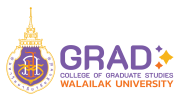Clinical Chemistry: 8 Vital Trends Every Medical Scholar Must Know With the College of Graduate Study at Walailak University
Clinical chemistry stands at the forefront of medical diagnostics, bridging the gap between laboratory research and clinical applications. For medical scholars pursuing Master’s and Doctoral degrees, staying informed about the latest advancements in clinical chemistry is crucial. The College of Graduate Study at Walailak University is home to esteemed Ph.D. faculty members specializing in tropical medicine, whose research contributions have significantly influenced the field. This article highlights eight vital trends in clinical chemistry that every medical scholar must understand
1. Biomarker Development for Disease Diagnosis
Advancements in biomarker discovery have revolutionized disease detection, allowing for early diagnosis and personalized treatment strategies. Researchers at Walailak University are actively engaged in studying novel biomarkers for infectious and non-communicable diseases, enhancing diagnostic precision in tropical medicine.
2. High-Throughput Screening and Automation
Automated laboratory technologies have drastically improved the efficiency and accuracy of clinical tests. Ph.D. researchers at Walailak University are exploring automation’s role in streamlining diagnostic processes, particularly in resource-limited settings where tropical diseases are prevalent.
3. Point-of-Care Testing Innovations
Point-of-care testing (POCT) has emerged as a critical tool for rapid disease diagnosis, especially in remote areas. Studies conducted by faculty members have demonstrated the effectiveness of POCT in managing endemic diseases such as malaria and dengue fever, reducing the time between diagnosis and treatment.
4. Advanced Spectroscopy and Imaging Techniques
Spectroscopic techniques, including mass spectrometry and nuclear magnetic resonance (NMR), have enhanced disease diagnosis and biomolecular analysis. Scholars at Walailak University have contributed to developing advanced methodologies that improve the sensitivity and specificity of clinical tests.
5. The Role of Artificial Intelligence in Clinical Chemistry
Machine learning and AI-driven models are transforming laboratory medicine by optimizing data analysis and predictive diagnostics. Researchers at Walailak University are integrating AI with clinical chemistry techniques to enhance diagnostic accuracy, particularly in tropical disease surveillance.
6. Metabolomics and Personalized Medicine
Metabolomics, the study of small-molecule metabolites within biological systems, is paving the way for personalized medical treatments. Research from the College of Graduate Study focuses on metabolic profiling to develop targeted therapies for patients suffering from infectious diseases prevalent in tropical regions.
7. Quality Control and Standardization in Laboratory Testing
Ensuring reliability and reproducibility in clinical chemistry tests is paramount. Scholars at Walailak University are engaged in projects that address quality control measures, enhancing the accuracy of diagnostic results and minimizing errors in medical laboratories.
7. Environmental and Occupational Toxicology
The impact of environmental and occupational hazards on human health has become a significant focus in clinical chemistry. Faculty members specializing in tropical medicine have conducted research on toxicological assessments, analyzing exposure to heavy metals, pesticides, and industrial chemicals in relation to disease development.
Conclusion
Clinical chemistry continues to evolve, driven by groundbreaking research and technological advancements. The Ph.D. faculty at the College of Graduate Study, Walailak University, play a pivotal role in expanding knowledge in this field, with their expertise in tropical medicine serving as a foundation for innovative diagnostic and therapeutic solutions. By staying informed about these eight vital trends, medical scholars can contribute meaningfully to the advancement of healthcare and clinical diagnostics in the global medical landscape.
Articles
Ursodeoxycholyl Lysophosphatidylethanolamide Protects Against CD95/FAS-Induced Fulminant Hepatitis
Increased activation of CD95/Fas by Fas ligand in viral hepatitis and autoimmunity is involved in pathogenesis of fulminant hepatitis and liver failure. We designed a bile-acid phospholipid conjugate ursodeoxycholyl lysophosphatidylethanolamide (UDCA-LPE with LPE containing oleate at the sn-1) as a hepatoprotectant that was shown to protect against fulminant hepatitis induced by endotoxin. We herein further assessed the ability of UDCA-LPE to prevent death receptor CD95/Fas-induced fulminant hepatitis….

Malondialdehyde as a useful biomarker of low hand grip strength in community-dwelling stroke patients
The assessment of muscle strength by hand grip strength (HGS) is used to evaluate muscle weakness and wasting among stroke patients. This study aimed to investigate the association of oxidative stress/oxidative damage and inflammatory biomarkers with muscle strength and wasting, as evaluated by HGS, among community-dwelling post-stroke patients. The HGS of both paretic and non-paretic limbs was negatively associated with modified Rankin scale (mRS) values….

Research
Promoter polymorphism of TNF-α (Rs1800629) is associated with ischemic stroke susceptibility in a southern Thai population
Stroke represents the leading cause of disability and mortality amongst the elderly worldwide. Multiple risk factors, including both genetic and non-genetic components, as well as their interactions, are proposed as etiological factors involved in the development of ischemic stroke (IS). Promoter polymorphisms of the IL-6-174G/C (rs1800795) and TNF-α-308G/A (rs1800629) genes have been considered as predictive risk factors of IS; however, these have not yet been evaluated in a Thai population. The aims of this study were to investigate the association of IL-6-174G/C and TNF-α-308G/A polymorphisms with IS….

Hepatoprotective effect of curcumin and alpha-tocopherol against cisplatin-induced oxidative stress - Tropical Medicine
cis-Diammineplatinum (II) dichloride (cisplatin) is the important anti-cancer agent useful in treatment of various cancers. Unfortunately, it can produce unwanted side effects in various tissues, including the liver. The present study investigated the possible protective role of curcumin and α-tocopherol against oxidative stress-induced hepatotoxicity in rats upon cisplatin treatment….

Clinical Chemistry
<< List of LECTURERS
Doctor of Philosophy Program in Health Sciences (International Program)


